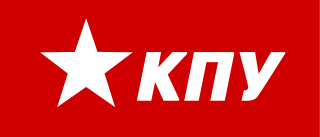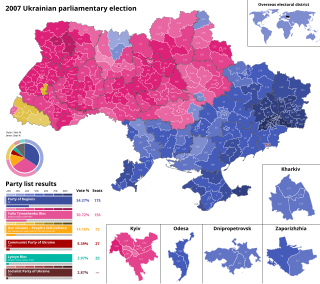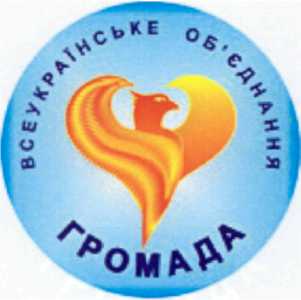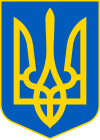This article presents the historical development and role of political parties in Ukrainian politics, and outlines more extensively the significant modern political parties since Ukraine gained independence in 1991.

The Communist Party of Ukraine is a banned political party in Ukraine. It was founded in 1993. It was claiming to be the successor to the Soviet-era Communist Party of Ukraine, which had been banned in 1991. In 2002 it held a "unification" congress when both "old and new" parties merged. The party is a member of the Moscow-based Union of Communist Parties – Communist Party of the Soviet Union, an umbrella organisation for all communist parties of the former Soviet Union. The party has been led by Petro Symonenko since it was founded.

For United Ukraine! was a political alliance and an electoral bloc in Ukraine founded in December 2001 to participate in the parliamentary election held on 31 March 2002.

The Socialist Party of Ukraine was a social democratic and democratic socialist political party in Ukraine. It was one of the oldest parties in Ukraine and was created by former members of the Soviet-era Communist Party of Ukraine in late 1991, when the Communist Party was banned. The party was represented in the Verkhovna Rada, Ukraine's parliament, from 1994 to 2007 and was the third and fourth largest party during that period. From 2007 onwards the party's electoral results became increasingly marginal, failing to win any seats in subsequent elections despite historically strong support in the central regions of the country. Oleksandr Moroz had led the party for more than twenty years before his resignation in 2012.


The Yulia Tymoshenko Bloc was the name of the bloc of political parties in Ukraine led by Yulia Tymoshenko since 2001. In November 2011, the participation of blocs of political parties in parliamentary elections was banned. The core party of the alliance, Batkivshchyna, remained a major force in Ukrainian politics.

The Party of Regions is a banned pro-Russian political party in Ukraine formed in late 1997 and then grown to be the biggest party in Ukraine between 2006 and 2014.
The All-Ukrainian Union "Fatherland", referred to as Batkivshchyna, is a political party in Ukraine led by People's Deputy of Ukraine, former Ukrainian Prime Minister Yulia Tymoshenko. As the core party of the former Yulia Tymoshenko Bloc, Batkivshchyna has been represented in the Verkhovna Rada since Yulia Tymoshenko set up the parliamentary faction of the same name in March 1999. After the November 2011 banning of the participation of blocs of political parties in parliamentary elections, Batkivshchyna became a major force in Ukrainian politics independently.
The People's Movement of Ukraine is a Ukrainian political party and first opposition party in Soviet Ukraine. Often it is simply referred to as the Movement. The party under the name Rukh was an observer member of the European People's Party (EPP) until 2013. It is considered to have played a key role in Ukraine regaining its independence in 1991.

Parliamentary elections were held in Ukraine on 26 March 2006. Election campaigning officially began on 7 July 2005. Between November 26 and 31 December 2005 party lists of candidates were formed.

Presidential elections were held in Ukraine on 31 October 1999, with a second round on 14 November. The result was a victory for Leonid Kuchma, who defeated Petro Symonenko in the run-off.

Parliamentary elections were held in Ukraine on 27 March 1994, with a second round between 2 and 10 April. 15 political parties gained seats and the majority of deputies were independents. However, 112 seats were remained unfilled, and a succession of by-elections were required in July, August, November and December 1994 and more in December 1995 and April 1996. Three hundred (300) seats or two thirds (2/3) of the parliament were required to be filled for the next convocation.

Early parliamentary elections were held in Ukraine on 30 September 2007. The election date was determined following agreement between the President Viktor Yushchenko, the Prime Minister Viktor Yanukovych and the Chairman of the Verkhovna Rada Oleksandr Moroz on 27 May 2007, in an attempt to resolve the political crisis in Ukraine triggered by the 2 April 2007 presidential decree on dissolution of Ukraine's parliament.

The European Party of Ukraine is a Ukrainian political party registered by the Ministry of Justice on August 3, 2006. Its ideology is social-liberalism, when the state should maintain harmonious social relations: create appropriate conditions for free competition, to prevent the formation of market monopolies and protect the vulnerable population strata. They advocate reforms that they claim will increase social standards of life of Ukrainians to the European level. They support integration of Ukraine into the European Union. Initially, the party was headed by Mykola Moskalenko. In August 2013 the party had more than 5,000 members. The party did not take part in national elections since 2012.

The Ukrainian Democratic Alliance for Reform of Vitali Klitschko is a political party in Ukraine headed by retired Ukrainian professional heavyweight boxer and the WBC world heavyweight champion emeritus Vitali Klitschko. The party has been an observer member of the European People's Party (EPP) since 2013.

All-Ukrainian Association "Community", often simply known as Hromada, is a Ukrainian political party registered in March 1994 and reregistered in March 2005. The party's leader was formerly Prime Minister of Ukraine Pavlo Lazarenko.

The 2010 Ukrainian local elections took place on 31 October 2010, two years before the 2012 general election. The voter turnout across Ukraine was about 50%, which is considered low in comparison to previous elections.

Volodymyr Dmytrovych Bondarenko was a Ukrainian politician who served as People's Deputy of Ukraine and as member of the citizens' association Choice. Bondarenko was the Head of the Kyiv City Administration from 7 March 2014 until 25 June 2014.
The Union "Self Reliance" is a liberal conservative and Christian democratic political party in Ukraine.
















